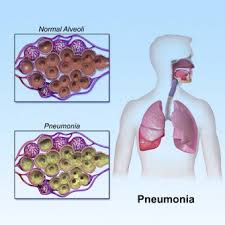Pneumonia is an infection in one or more lungs.It is caused by bacteria,viruses or fungi
Symptoms of bacterial pneumonia?
The most common symptoms of bacterial pneumonia are:
- a cough with thick yellow, green, or blood-tinged mucus
- Stabbing chest pain that worsens when coughing or breathing
- sudden onset of chills severe enough to make you shake
- Fever of 102-105°F or above (fever lower than 102°F in older persons)
Other symptoms that may follow include:
- headache
- muscle pain
- Breathlessness or rapid breathing
- lethargy or severe fatigue
- moist, pale skin
- confusion, especially among older persons
- loss of appetite
- sweating
Older adults will share all the symptoms with younger adults, but are much more likely to experience confusion and dizziness. Older adults may also be less likely to have a fever.
Types of pneumonia:
Pneumonia can be typical or atypical.
Atypical pneumonia: also known as walking pneumonia. It is nonproductive and caused by following microorganisms,
- Mycoplasma pneumoniae
- Chlamydia
- Legionella
- Influenza
Typical pneumonia:productive cough,organisms are seen on culture.
- Staphylococcus pneumonia
- Staphylococcus aureus
- Streptococcus pyogenes
- Klebsiella
- H.influenza
Treatment:
Specific treatments depend on the type and severity of your pneumonia, your age and your overall health. The options include:
- Antibiotics. These medicines are used to treat bacterial pneumonia. It may take time to identify the type of bacteria causing your pneumonia and to choose the best antibiotic to treat it. If your symptoms don’t improve, your doctor may recommend a different antibiotic.
- Cough medicine. This medicine may be used to calm your cough so that you can rest. Because coughing helps loosen and move fluid from your lungs, it’s a good idea not to eliminate your cough completely. In addition, you should know that very few studies have looked at whether over-the-counter cough medicines lessen coughing caused by pneumonia. If you want to try a cough suppressant, use the lowest dose that helps you rest.
- Fever reducers/pain relievers. You may take these as needed for fever and discomfort. These include drugs such as aspirin, ibuprofen (Advil, Motrin IB, others) and acetaminophen (Tylenol, others).
The two most common causes of pneumonia are bacteria and viruses. The flu is one of the most common causes of viral pneumonia in adults, though post-flu complications can also cause bacterial pneumonia.
| Viral pneumonia | Bacterial pneumonia | |
| Who? | most likely to affect healthy people with strong immune systems | more likely to affect someone with a lowered immune system, or someone who is recovering from a respiratory infection |
| Treatment | antibiotics don’t work | antibiotics may be prescribed |
| Outlook | can be severe and fatal | may be more aggressive and difficult to treat |






